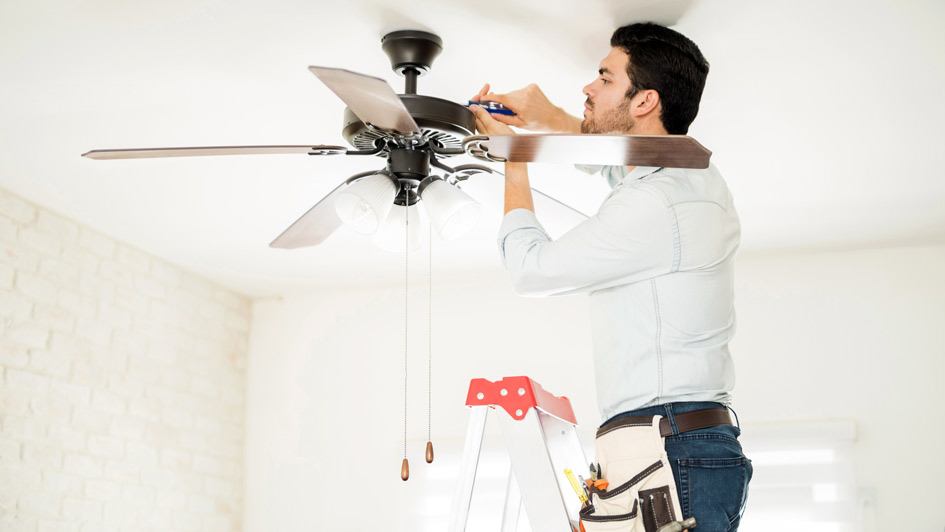
Ceiling fans are one of the most underrated ways to make your home more comfortable and reduce energy costs. By improving air circulation and supporting your HVAC system, ceiling fans and energy efficiency are truly a perfect combination. They offer a smart, cost-saving way to stay cool while reducing strain on your AC—potentially sparing you from unnecessary air conditioning repair.
In this blog, the experts at Walter's-Eaton's Electric, Plumbing, Heating & AC explain how ceiling fans can improve your comfort while saving you money thanks to increased HVAC efficiency. We'll also offer some HVAC efficiency tips that put to good use ceiling fans.
Comfort vs. Temperature: The Effect of the Wind-Chill Effect Indoors
Ceiling fans don’t actually lower the room temperature—they make your home more comfortable by blowing air across your skin. This is referred to as the wind-chill effect, and it can make a room feel up to 4 degrees cooler without adjusting the thermostat. That means you remain cool and enjoy the benefits of indoor air circulation from your ceiling fan while minimizing air conditioner use—helping reduce your electric bill in summer.
The Best of Both: Benefits of Using Fans and Air Conditioning Together
There are several benefits to using ceiling fans and air conditioning at the same time, especially when it's very hot outside. By using both, you boost HVAC efficiency and maintain a comfortable indoor temperature with less effort from your cooling system.
Why you should use ceiling fans and AC together:
- Ceiling fans help lower HVAC load by moving cool air more evenly around the room. Limiting HVAC stress is important, because it can save you from a breakdown that could lead to premature AC or furnace installation.
- Using overhead fans improves your indoor comfort by reducing uneven temperatures and increasing airflow.
- Pairing ceiling fans and AC can cut energy consumption. If you have a home automation system, you can even adjust your smart thermostat settings to set the temperature higher while your ceiling fan is running.
Clockwise vs. Counterclockwise Ceiling Fan Rotation: Which Direction Should a Fan Spin?
To make full use of your ceiling fans year-round, it’s important to make sure the blades rotate in the right direction for the season. The direction affects how air moves, which can either or push warm air downward so you feel warmer.
When to spin ceiling fans counterclockwise
When it's hot outside, ceiling fans should rotate counterclockwise at a quick speed. This creates a breeze that forces cool air down, enhancing the wind-chill effect and causing you to feel cooler.
When to spin ceiling fans clockwise
When it's cold out, set your fan to spin clockwise on a gentle setting. This lifts cooler air and circulates heated air down to where you can feel it, so you feel warmer without adjusting your thermostat.
What Type of Ceiling Fan Is Best
Selecting the best ceiling fan depends on a few key factors, such as blade design, airflow rating and room dimensions. First, look for fans with a good balance of ECFM airflow and blade pitch to provide efficient air circulation in your home:
- ECFM is the amount of air a fan pushes—the cubic feet per minute, or CFM—per watt of electricity used. Fans with greater ECFM are the most energy efficient.
- Blade pitch refers to the tilt of the blades. A sharper blade pitch moves more air than a shallower pitch but can also stress the fan’s motor.
Also, consider room size when sizing a ceiling fan—a fan that’s too small won’t move as much air as you'd like, while one that’s too large may be too strong for the space.
Raise Your HVAC Efficiency With the Team from Walter's-Eaton's Electric, Plumbing, Heating & AC
At Walter's-Eaton's Electric, Plumbing, Heating & AC, our HVAC specialists can help you stay comfortable while reducing strain on your heating and cooling systems. From efficient ceiling fan strategies and air conditioning installation to smart thermostats and furnace repair, we offer comprehensive services that work with your budget. Reserve your appointment by calling 715-603-4483 today.

